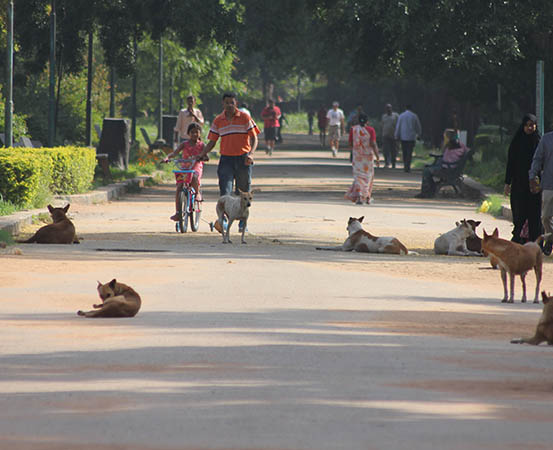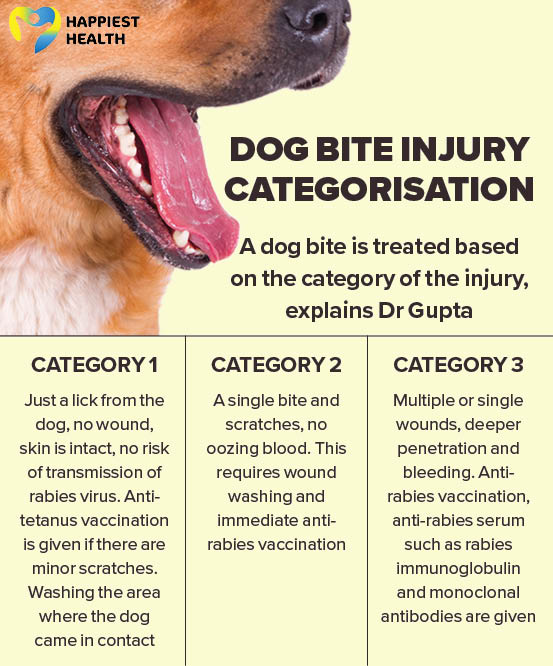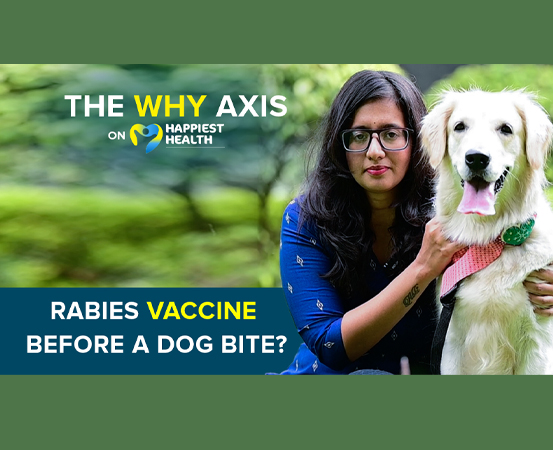
It is imperative not to ignore a bite or even a simple scratch from a dog, say doctors.
“Rabies is a 100 per cent fatal disease,” says Dr MK Sudarshan, community medicine expert from Bengaluru and founder president of the Association for Prevention and Control of Rabies in India (APCRI). “Rabies is caused by the bullet-shaped rhabdovirus that is present in the rabid animal’s saliva. Following the bite of a rabid animal, the virus in the salvia is deposited on the wound of the bitten person. Hence, in case of a dog bite, the focus must be rabies prevention.”
Dr Kapil Gupta, consultant, department of emergency medicine, Manipal Hospitals, Dwaraka, Delhi, says that the most common myth is that the dog is vaccinated and it’s only a scratch and the scratch may not cause rabies infection. “Rabies is only a preventable infection and cannot be cured. Even if there is the slightest chance of catching the infection, one must take precautions to prevent the same. The major problem with the virus is that it has a very long incubation period,” says Dr Gupta, who is also the president of the Association of Emergency Physicians of India.
READ MORE :
Frostbite: the cold hard facts
How to manage a jellyfish sting
What to do when a scorpion stings
Measures to prevent rabies after a dog bite
Dr Sudarshan stresses the importance of removing and neutralising the virus through prompt first aid. He suggests the following steps in case of a dog bite:
- Flush the wounds with soap and water. The saliva of the animal (dog in this case) contains the virus. Hence, removing the saliva wound through water and soap is the first step. While any soap kills the virus, detergent soaps are more alkaline and are more effective. The lipid (fat) coat on the virus will be destroyed by the soap.
- Apply an antiseptic topical medication as it neutralises the virus. After this, the wound should be dried using cotton.
- Must consult a doctor at the earliest.
Once the affected person is taken to the emergency room, the medical staff checks the severity of the injury. “Depending on the nature of the injury, anti-rabies vaccination (ARV), anti-rabies serum (ARS) and anti-tetanus vaccination are given,” says Dr Sudarshan. During a dog bite, there are chances of falls and contact with soil. Hence, tetanus prevention is also required.
Doctors say that rabies vaccination contains five doses which are given on day 0 (the day of the dog bite), day 3, day 7, day 14 and day 28. These vaccinations are essential in rabies-endemic regions like India.
Treating dog bites

Dr Gupta says that anti-rabies serum is given in case of category-3 bites, along with the anti-rabies vaccination, because it takes seven days for a person to develop antibodies. So, the ARS gives passive immunity through readymade antibodies.
“The ARS helps in neutralising the virus before the vaccination produces antibodies and gives protection,” says Dr Sudarshan.
According to WHO’s fact sheet about rabies, the incubation period is typically two to three months. But it may vary from one week to one year, depending on factors such as the location of virus entry and the viral load.
“There are no tests available to diagnose if a person is a carrier of the rabies virus or not. That’s the major problem,” says Dr Gupta.
Dr Gupta further adds that the anti-rabies vaccination is short-lived. Those vaccinated against rabies following a dog bite will still require vaccination within ten years if they have another exposure to a dog bite.
The typical signs of rabies are salivation, fever, hydrophobia (fear of water), aerophobia (fear of air), confusion, altered sensorium (the inability to think clearly) and talking irrelevantly. “These mean that the virus has spread to various parts of the body and we can’t do much,” says Dr Gupta.
What if your pet dog scratches you?
One of the frequently asked questions is whether pet owners require an anti-rabies vaccination every time they get scratched by their dog that is vaccinated against rabies.
Dr Sudarshan says it’s best to be safe. “One must guarantee that their pet dog hasn’t come in contact with a stray or an unvaccinated dog in the last six months. The known incubation period of rabies in dogs is six months. The source of the virus is the saliva. The paws could have saliva. There are chances of the infection spreading from the dogs even when they lick on any human wound. In all such cases, one must consult a doctor and take ARV,” says Dr Sudarshan.
What not to do in case of a dog bite
Dr Sudarshan cautions against some of the commonly practised self-remedies.
- Do not apply turmeric and neem leaf paste on the wound. They can act as irritants and are likely to push the virus inside.
- Do not put diesel, tea leaves and red chilli powder on the wound.
- Do not presume that a dog that bit you is vaccinated against rabies. Do not ignore the anti-rabies vaccination for yourself.
- Do not discontinue the anti-rabies vaccination. Stick to the vaccination schedule
Takeaways
- Rabies is only a preventable disease and there is no cure.
- The treatment for a dog bite depends on the nature of the injury and what the bite has been categorised as.
- In rabies-endemic countries like India, five doses of anti-rabies vaccination are essential.
- There is no test to diagnose if a person is a carrier of the rabies virus.

















